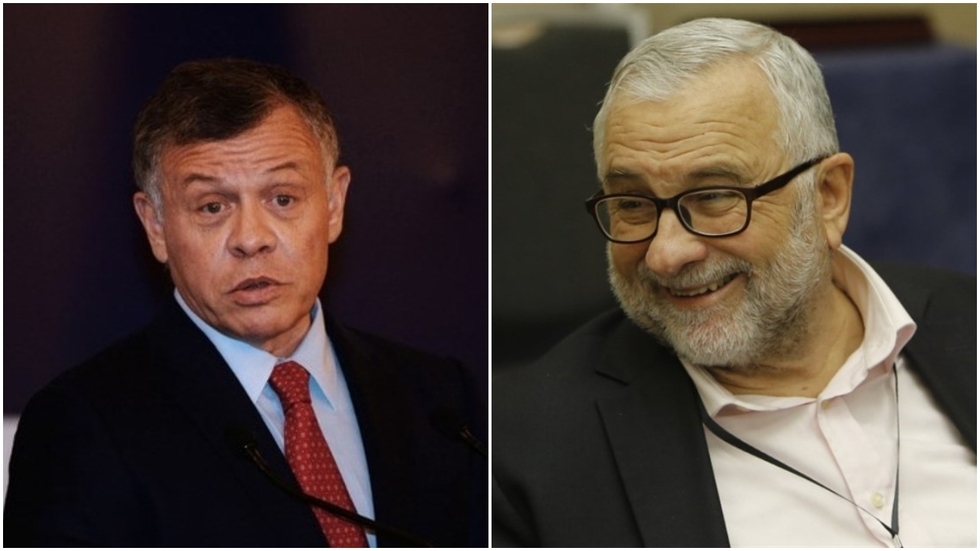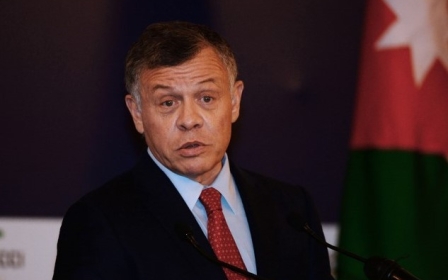Jordan's role in region diminished under King Abdullah, opposition figure says

The Jordanian king and government came under further pressure on Tuesday as a prominent opposition politician said the country's role in the region had been downgraded by Israel and the US from the rank of brigadier general to lieutenant.
In an interview with the Lebanese newspaper Al-Akhbar, Laith Shubeilat said that "Jordan was an Israeli ally with a brigadier general rank, but now it has been downgraded to lieutenant and Saudi Arabia rose to be the general."
Shubeilat's criticism follows hot on the heels of comments by Fares al-Fayez, another prominent opposition figure, who was arrested on Saturday for calling for political change.
Fayez's Beni Sakhr tribe said on Sunday it would block the main road between the capital Amman and town of Madaba and disrupt flights from Jordan's main airport unless Fayez was released.
Some news of the Amman-Madaba road being blocked overnight Monday was reported on social media, but Middle East Eye could not confirm details of what happened.
Jordan has witnessed days of street protests and public calls for the overthrow of its government in response to rising prices and planned economic reforms, including an income tax hike.
Despite replacing the prime minister, ditching several of the most unpopular economic measures and a $2.5bn aid package promised by Saudi Arabia, the United Arab Emirates and Kuwait, discontent still rumbles on in the desert kingdom.
Scathing criticism
Shubeilat said that Jordan can get out of its critical economic situation by allying with Iran and Turkey.
"The king should have a conscience and gather the people around him. We will starve and be punished, but we are a tough number and our geopolitical position is critical, and they [Gulf countries] should make better deals with us," Shubeilat said.
'Jordan was an Israeli ally with a brigadier general rank, but now it has been downgraded to lieutenant and Saudi Arabia rose to be the general'
- Laith Shubeilat, opposition figure
Shubeilat, an outspoken and harsh critic of Jordan's King Abdullah II and his father King Hussein has been arrested several times since 1989 for his anti-government opinions. He was released each time by a royal order.
The opposition figure suggested Abdullah should take his father's example and not be drawn into conflicts and policies that go against Jordanian popular opinion.
He pointed to King Hussein's refusal to be part of the US-led force fighting in the 1990 Gulf War, despite pressure from Washington and Arab countries such as Syria and Egypt that fought the Iraqi army after its invasion of Kuwait.
"Jordanians gathered around King Hussein and we overcame the obstacle. Back then, the political situation was very hard because America was the only power in the world. But today, it is different. Europe's interests have changed and you have China and Russia. You also have Iran and Turkey, which are not in America's orbit," Shubeilat said.
Shubeilat also took aim at Abdullah's custodianship of the al-Aqsa Mosque compound in Jerusalem, one of Islam's holiest sites, which is a role he occupies as head of the Hashemite dynasty.
"The king does not understand the deep meaning of the custodianship he inherited from his father," he said.
"His great-grandfather, the leader of the Arab Revolt [of 1916 that overthrew the ruling Ottomans] is buried in Jerusalem. His grandfather, Abdullah, was martyred in the Old City of Jerusalem. There is a blood relation between Jerusalem and the Hashemites."
"But you need Hashemites who can fathom the greatness of this responsibility and are prepared to be martyrs to protect it," he added.
King Abdullah has been accused of taking the Gulf Arab aid package in return for softening his stance on the US recognition of Jerusalem as Israel's capital.
The Palestinians and many Arabs want to see East Jerusalem, which the Israelis captured from Jordan in 1967, as the capital of a future Palestinian state.
Tribe trouble
Fayez's comments on 6 June, which resulted in his arrest, were no less incendiary.
Fayez accused Abdullah of acting like a "demigod" and called for Jordan's political system to change to a constitutional monarchy.
"We want to change the political formula. We will not accept you [Abdullah] as a king, prime minister, defence minister, police chief and governor. You are everything. You became a demigod, according to this constitution, and we are slaves," Fayez said.
'You became a demigod, according to this constitution, and we are slaves'
- Fares al-Fayed, opposition figure
"This is our country and our land. You came from the Hijaz, you, your father and your grandfather. My father welcomed your grandfather. You owe us, we do not owe you."
Under Jordan's current constitution, the king holds all of the main positions of authority in the state.
King Abdullah's Hashemite tribe originated from the Hijaz region in modern-day Saudi Arabia, but were pushed out by the al-Sauds in the 1920s after years of conflict in the Arabian peninsula.
The Hashemites were welcomed by other tribes in Jordan after the First World War and were installed as the country's ruling family with British military and political support.
Fayez has long been a fierce critic of the Jordanian government and King Abdullah. He was outspoken during the 2011 Arab Spring protests that took part in Jordan.
Stay informed with MEE's newsletters
Sign up to get the latest alerts, insights and analysis, starting with Turkey Unpacked
Middle East Eye delivers independent and unrivalled coverage and analysis of the Middle East, North Africa and beyond. To learn more about republishing this content and the associated fees, please fill out this form. More about MEE can be found here.





